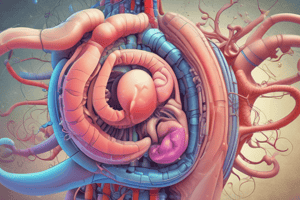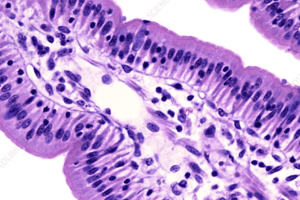Podcast
Questions and Answers
What is the primary function of the gastrointestinal system?
What is the primary function of the gastrointestinal system?
- Transport blood throughout the body
- Produce hormones and neurotransmitters
- Absorb water and electrolytes
- Break down nutrients and absorb them (correct)
Insufficiency of digestion can be classified into which types?
Insufficiency of digestion can be classified into which types?
- General and selective (correct)
- Acute and chronic
- Morphological and functional
- Mild and severe
Which factors are included in the etiology of digestive system diseases?
Which factors are included in the etiology of digestive system diseases?
- Exposure to pathogens and congenital abnormalities (correct)
- Psychological stress and employment status
- Allergy to food and age-related changes
- Criminal behavior and economic status
What is generally impacted by the activation of the sympathetic nervous system in the gastrointestinal system?
What is generally impacted by the activation of the sympathetic nervous system in the gastrointestinal system?
What can inadequately digested nutrients lead to?
What can inadequately digested nutrients lead to?
Among the following, which is NOT considered an alimentary factor impacting digestive health?
Among the following, which is NOT considered an alimentary factor impacting digestive health?
Disorders of the digestive system can be classified based on which principle?
Disorders of the digestive system can be classified based on which principle?
Which of the following are examples of biological factors contributing to digestive system diseases?
Which of the following are examples of biological factors contributing to digestive system diseases?
Which of the following statements about the digestive system is true?
Which of the following statements about the digestive system is true?
What factor is least likely to influence digestive system pathology?
What factor is least likely to influence digestive system pathology?
Flashcards
Function of GI system
Function of GI system
Break down nutrients and absorb them into the body.
Digestion insufficiency
Digestion insufficiency
Deficiency in digesting and absorbing nutrients.
Digestive Disorders Classification
Digestive Disorders Classification
Categorization based on factors like location, severity, cause, and affected functions.
Sympathetic NS effect on GI
Sympathetic NS effect on GI
Slows down GI system functions.
Signup and view all the flashcards
Parasympathetic NS effect on GI
Parasympathetic NS effect on GI
Increases GI system functions.
Signup and view all the flashcards
Etiological factors (GI)
Etiological factors (GI)
Causes of digestive system diseases from various sources (diet, enviroment, biology, etc).
Signup and view all the flashcards
Alimentary Factors
Alimentary Factors
Diet related factors affecting GI health.
Signup and view all the flashcards
Physical Factors (GI)
Physical Factors (GI)
Physical influences like Radiation affecting the GI.
Signup and view all the flashcards
Biological Factors (GI)
Biological Factors (GI)
Infectious agents affecting the GI, e.g., bacteria or parasites.
Signup and view all the flashcards
Mental/Social Factors (GI)
Mental/Social Factors (GI)
Mental (stress, emotion) and Social issues affecting GI health.
Signup and view all the flashcardsStudy Notes
Gastrointestinal System Pathophysiology
- The main function of the gastrointestinal system is breaking down nutrients and absorbing them into the body. This happens through mechanical processes (like grinding) and digestive juices.
- The system has hormone-producing glands and nerve plexuses (Auerbach and Meissner) that function under the autonomic nervous system.
- Activation of the sympathetic nervous system decreases motor and secretory functions. Parasympathetic activation increases these functions.
- Digestive insufficiency is a violation of digestion and absorption, divided into general (total) and selective (partial) deficiencies. A general deficiency impacts all nutrients, while a selective deficiency affects individual nutrients.
- Digestive disorders are classified by anatomical location (oral cavity, stomach, intestines), course (acute or chronic), etiology (congenital or acquired), and pathophysiological principles (motor, secretory, absorption, and other functions).
Etiology of Digestive System Diseases
- Various etiological factors influence digestive system diseases:
- Alimentary Factors: Dry, rough, hot, cold, or poor quality food.
- Physical Factors: Ionizing radiation.
- Chemical Factors: Salts of heavy metals and poisons.
- Biological Factors: Causative agents of typhoid fever, dysentery, helminth infections, Helicobacter pylori.
- Mental Factors: Negative emotions and stress.
- Social Factors: Bad habits.
- Congenital Anomalies: Of the digestive tract.
- Tumors and Endocrinopathies: Postoperative conditions.
- Other factors include:
- Pathology in various systems (blood circulation, liver, kidneys, endocrine glands).
- Changes in substances like hormones, prostaglandins, peptides, and biogenic amines.
- Neurogenic influences (sympathetic/parasympathetic nervous systems).
- Other factors like reactivity, gender, age, and hereditary predisposition.
Studying That Suits You
Use AI to generate personalized quizzes and flashcards to suit your learning preferences.





